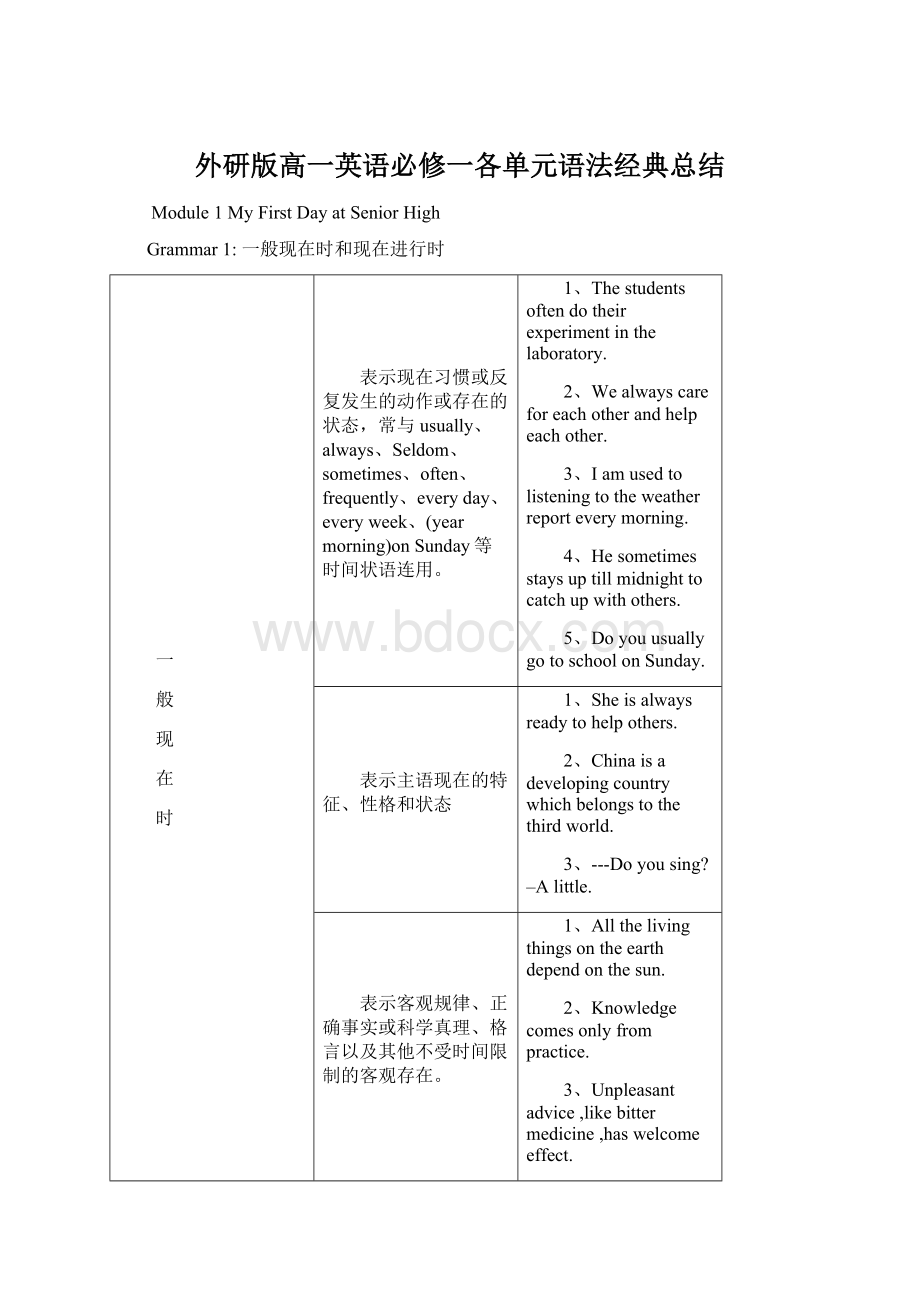外研版高一英语必修一各单元语法经典总结文档格式.docx
《外研版高一英语必修一各单元语法经典总结文档格式.docx》由会员分享,可在线阅读,更多相关《外研版高一英语必修一各单元语法经典总结文档格式.docx(27页珍藏版)》请在冰豆网上搜索。

3、Iamusedtolisteningtotheweatherreporteverymorning.
4、Hesometimesstaysuptillmidnighttocatchupwithothers.
5、DoyouusuallygotoschoolonSunday.
表示主语现在的特征、性格和状态
1、Sheisalwaysreadytohelpothers.
2、Chinaisadevelopingcountrywhichbelongstothethirdworld.
3、---Doyousing?
–Alittle.
表示客观规律、正确事实或科学真理、格言以及其他不受时间限制的客观存在。
1、Allthelivingthingsontheearthdependonthesun.
2、Knowledgecomesonlyfrompractice.
3、Unpleasantadvice,likebittermedicine,haswelcomeeffect.
*Ourteachertoldustheearthgoesroundthesun.
在由连词if、unless、before、assoonaswhen、once、however等引起的时间(条件、让步)状语从句,需用一般现在时,表示将来。
1、I’llcallonyouunlessitrainsthedayaftertomorrow.
2、Evenifitrainstomorrow,thesportsmeetwilltakeplace.
3、Wewillstartassoonasyouareready.
4、Howevermuchadviceyougivehim,hewilldoexactlywhathewants.
表示安排或计划要做的动作(有时间状语)限于begin、come、leave、go、arrive、start、stop、open、close、return等
1、Thefilmstartsatseveno’clockthisevening.
2、Theplanetakesoffat5:
00a.m.
3、WeleaveforBeijingnextFriday.
进
行
用法
例示
表示现在(说话的瞬间)正在进行或发生的动作
1、Look,theboyisdozingoff.
2、Look!
Themonkeyisclimbingthebananatree.
3、Ihaven’tacceptedhissuggestionyet.I’mstillconsideringit.
表示当前一段时间内的活动或现阶段正在进行的动作(说话时动作不一定正在进行)
1、HowareyougettingalongwithyourEnglishtheseday.
2、Wearegoingoverthegrammarlearnedbeforeatpresent.
3、WarepreparingforthemeetingtobeheldnextFridaynow.
表示说话人现在对主语的行为表赞叹,厌恶等,常与always\constantly\continually等副词连用
1、Heisalwaysthinkingofothers.(表赞许)
2、Heisconstantlyleavinghisthingsabout.(表不满)
3、Thechildrenarealwaysmakingtrouble.(表厌恶)
4、Sheisalwaysaskingthesamequestion.(表厌恶)
5、Youarealwayschangingyourmind.(表抱怨)
表示在最近计划或安排要进行的动作,常限于go\come\leave\start\arrive\return\work\sleep\stay\do\have\wear等表移动,方向的动词
1、Heisstartingtheworkinafewminutes.
2、AforeignguestisgivingalectureinEnglishthisafternoon.
3、HeisleavingforBeijingtomorrowafternoon.
4、Heiscomingtoseeyounextmonth.
5、Heisstayingwithusforafewweeksnextyear.
Grammar2:
分词形容词
英语中有些形容词是由动词的---ing构成的(通常表示事物给人的感觉,意为“是令人感到…..的”),有些形容词是由动词的------ed构成的(通常表示人对事物的感觉,意为“对……感到……的”)。
前者表示主动的意义,后者表示被动的意义。
由于他们的形式与现在分词和过去分词完全一样,故又称它们为“分词形容词”,在句中做表、定、状、补等成分。
常见的有:
amazing----amazedamusing----amusedastonishing----astonishedfrighting-------frightened
boring----boredconfusing--confuseddisappointing—disappointedmoving------moved
disturbing-disturbeddiscouraging--discouragedencouraging–encouragedtiring------tired
Module2MyNewTeachers
Grammar:
后接V-ing的动词
(1)英语中有很多的动词后只跟动名词作宾语:
如
advise,consider,admit,appreciate,mind,avoid,excuse,delay,imagine,deny,enjoy,keep(on),practice,resist,escape,risk,putoff,explain,quit(停止),tolerate,pardon,allow,forbid,miss(错过),suggest,advise,recommend,finish,envy,can’thelp
(2)有一类动词后直接跟动名词形式作宾语;
如果后面跟名词、代词加宾补,则宾补用不定式‘这类常见的可记忆为“阿福的帽子”:
FU’SCAP:
allow,forbid,understand,suppose,consider,advise,permitted
eg:
①Wedon’tallowusingmobilephonehere.
②Wedon’tallowhimtousemobilephonehere.
③Heisnotallowedtousemobilephonehere.
(3)“动词+介词”构成的短语,其后往往跟动名词作宾语。
尤其是含有介词“to“的动名词短语;
beusedto习惯于,
devoteoneselfto致力于;
leadto导致;
seeto注意,处理payattentionto;
getdownto;
stickto;
getaccustomedto;
lookforwardto
(4)“what\howabout+v-ing”常用来征询意见,意为“。
。
怎么样?
Whataboutgoingonapicnic?
(5)有些动词后跟不定式与动名词的意义差别较大,高考出现频率较大:
forgettodosthremembertodosth
doingsthdoingsth
regrettodosthstoptodosth
meantodosthtrytodosth(努力\试图做sth)
doingsthdoingsth(尝试做某事)
goontodosthcan’thelptodosth
doingsth(withsth)doingsth
【注】:
remember,forget,regret后跟doing与跟havingdone的意思一样。
(6)动名词的复合结构:
动名词的前面可以有自己的逻辑主语构成动名词的复合结构。
其结构由物主代词或人称代词(宾语)、名词所有格或普通格加动名词构成,在句子开头必须用名词所有格或物主代词。
①Tom’sdoingsth可作主、宾、表
Hisdoingsth
②Tomdoingsth可作主、表
Himdoingsth
Module3MyFirstRideonaTrain
动词的过去分词
①及物动词的过去分词作定语表示被动或完成,或两者兼而有之
eg:
arespectedteacherabrokencup
②不及物动词的过去分词作定语只表示完成的含义
eg:
Heisaretiredworker.
③V-ed形式的分词形容词作定语说明所修饰的名词的状态,无被动的含义,是一个形容词
(1)作定语eg:
asurprisedlookdisapointedchildren
④过去分词可以和形容词或副词一起构成合成形容词一起做前置定语
ahighly-developedindustryawidely-usedlanguage
⑤过去分词短语作后置定语放在所修饰词的后面,逻辑上相当于一个被动的定语从句
→Itisabook(whichis)recommendedbytheteacher.
→Manypeople(whowere)invitedtothepartywerefamousscientists.
(2)作表语:
表示主语的特点或所处的状态
Thedo